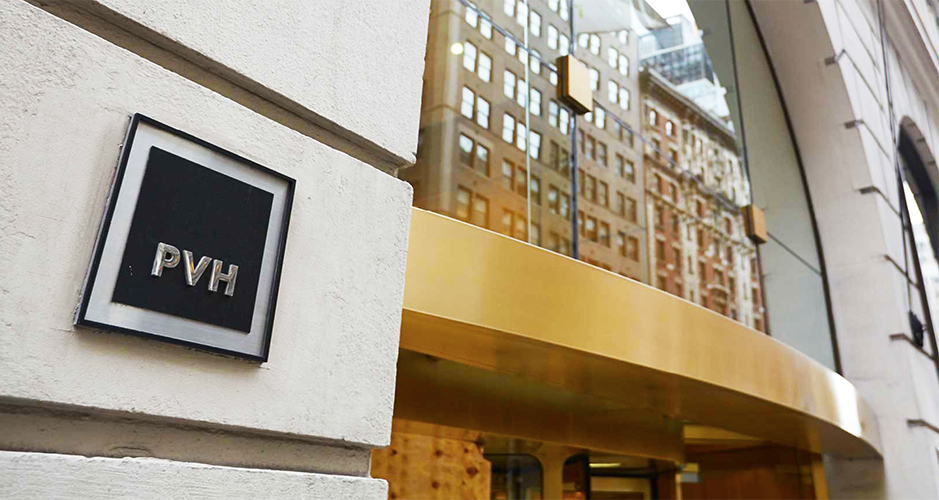PVH Corp. reported non-GAAP earnings per share for the fourth quarter of $1.88, topping Wall Street’s estimates by 7 cents. Q4 revenue of $2.6 billion beat expectations by $140 million. PVH, like most public companies, withdrew guidance for 2020 due to the coronavirus.
Earnings per share on a GAAP basis was $5.60 for the full year 2019 compared to guidance of approximately $6.32. The decrease of $0.72 per share was primarily driven by (1) an approximately $0.81 per share decrease compared to guidance primarily due to a pre-tax actuarial loss of $98 million recognized on retirement plans which was not included in the guidance, as well as other changes resulting from the other items for the applicable period described under the heading “Non-GAAP Exclusions” later in this release, partially offset by (2) an aggregate increase compared to guidance of $0.09 per share as described in the earnings per share on a non-GAAP basis discussion below.
Earnings per share on a non-GAAP basis were $9.54 for the full-year 2019 compared to guidance of at least $9.45.
Commenting on these results, Emanuel Chirico, chairman and CEO, noted, “PVH ended the year with a strong holiday season and increasing momentum across Tommy Hilfiger and Calvin Klein in the majority of the regions where we operate. We are very pleased with these results, with revenue as well as earnings per share on a non-GAAP basis exceeding our guidance.”
Chirico continued, “I believe that we are in a solid financial position to navigate the COVID-19 outbreak and this period of unprecedented volatility. Our balance sheet has always been one of our core strengths, and we have over $1 billion in cash and available borrowings. We also are taking a hard look at all of our discretionary spending, payroll and salary reductions, capital expenditures and inventory management with a firm focus on managing our cash flow and preserving our cash position and financial standing.”
Chirico concluded, “While the outbreak is highly dynamic and continues to unfold, my confidence in the power of PVH and our ability to navigate this crisis is unwavering. With a nearly 140 year history, I believe that our core strengths — our talent, our brands and our strong fundamentals and balance sheet — will continue to support us through this uncertain time and ultimately lead us back to a healthy path of long-term growth once the pandemic subsides.”
COVID-19 Pandemic
The COVID-19 pandemic is having a significant impact on the company’s business, results of operations, financial condition and cash flow in 2020.
Virus-related concerns, reduced travel, temporary store closures, and government-imposed restrictions have resulted in sharply reduced traffic and consumer spending trends and sales stoppages in the company’s retail stores in virtually all key markets during the first quarter of 2020 and are similarly impacting the company’s wholesale customers and licensing partners. In addition, the company’s supply chain, and the supply chains of its licensing partners, have been disrupted and may experience future disruptions as a result of either closed factories or factories operating with reduced workforces.
There is significant uncertainty about the duration and extent of the negative impacts of the COVID-19 pandemic on the company and its business partners. The company is monitoring the situation closely with regards to its associates, customers, business partners, and supply chain. Given the dynamic nature of the circumstances surrounding the pandemic, the company’s results could be impacted significantly in ways the company is not able to predict today. The company, therefore, has not provided guidance for its first quarter and full-year 2020.
In addition, depending on the duration and extent of the pandemic, the company’s results of operations, financial condition and cash flows in 2020 also may be significantly negatively impacted by, among other things, noncash asset impairments, excess inventory and difficulty collecting trade receivables.
Liquidity / Financial Flexibility
The company has a long history of successfully navigating and managing through economic cycles and turbulent uncertain times. The company ended 2019 with cash of $503 million and with inventory levels down 7 percent compared to the prior year. In order to preserve liquidity and ensure the company’s financial flexibility, the company has taken, or is taking, the following steps:
- Drew down $750 million from its over $1 billion revolving credit facility to add to cash balances while maintaining untapped capital through its revolving credit facility;
- Suspended share repurchases under the stock repurchase program. The company has approximately $600 million remaining on its current stock repurchase authorization following $325 million in repurchases in 2019 and approximately $110 million completed in the first quarter of 2020;
- Suspending its cash dividend beginning with the second quarter of 2020. The company’s previously announced cash dividend of $0.0375 per common share paid on March 31, 2020 was not affected by this suspension;
- Reviewing every opportunity to eliminate discretionary operating expenses while reducing capital expenditures to approximately $190 million from $345 million in 2019;
- Tightly managing inventories with a focus on reducing its working capital; and
- The company entered into a definitive agreement on January 9, 2020 to sell its Speedo North America business to Pentland Group PLC, the parent company of the Speedo brand, for $170 million in cash subject to a working capital adjustment (the “Speedo transaction”). The sale is expected to close in the first quarter of 2020.
Fourth Quarter Business Review
The company’s fourth-quarter 2019 results include two acquisitions that closed in the second quarter of 2019. The first was the company’s acquisition of the approximately 78 percent interest in Gazal Corporation Limited (“Gazal”) that it did not already own (the “Australia acquisition”). The company and Gazal jointly owned and managed a joint venture, PVH Brands Australia Pty. Limited (“PVH Australia”), which licensed and operated businesses under the “Tommy Hilfiger,” “Calvin Klein” and “Van Heusen” brands along with other owned and licensed brands. PVH Australia came under the company’s full control as a result of the Australia acquisition. The second was the company’s acquisition of the Tommy Hilfiger retail business in Central and Southeast Asia from the licensee of the business (the “TH CSAP acquisition”).
Tommy Hilfiger
Revenue in the Tommy Hilfiger business for the quarter increased 12 percent to $1.3 billion (increased 13 percent on a constant-currency basis) compared to the prior-year period. Tommy Hilfiger International’s revenue increased 20 percent to $865 million (increased 22 percent on a constant-currency basis) compared to the prior-year period primarily driven by continued outperformance in Europe and the addition of revenue resulting from Australia and TH CSAP acquisitions. International comparable store sales increased 10 percent. Tommy Hilfiger North America revenue decreased 2 percent to $440 million compared to the prior-year period as growth in the North America wholesale business was more than offset by a 6 percent decline in North America comparable store sales due to continued weakness in traffic and consumer spending trends especially in stores located in international tourist locations.
Earnings before interest and taxes on a GAAP basis for the quarter decreased to $145 million from $168 million in the prior-year period. Included in earnings before interest and taxes for the fourth quarter of 2019 were costs of $3 million related to the portion of the Australia acquisition costs attributable to the Tommy Hilfiger business primarily consisting of noncash valuation adjustments. Included in earnings before interest and taxes for the prior-year period were costs of $4 million related to the April 2016 acquisition of the 55 percent interest in the company’s former Tommy Hilfiger joint venture in China that it did not already own (the “TH China acquisition”) consisting of noncash amortization of short-lived assets. Earnings before interest and taxes on a non-GAAP basis for these periods, as discussed below, exclude these amounts.
Earnings before interest and taxes on a non-GAAP basis for the quarter decreased to $148 million from $171 million in the prior-year period. The earnings decline was principally due to the continued gross margin pressure experienced in the North America retail business, the negative impact of additional inventory reserves recorded in anticipation of lower sales trends as a result of the onset of the COVID-19 outbreak and a planned increase in marketing expenditures compared to the prior-year period which more than offset the revenue growth in the international business noted above.
Calvin Klein
Revenue in the Calvin Klein business for the quarter decreased 2 percent to $936 million (decreased 1 percent on a constant-currency basis) compared to the prior-year period. Calvin Klein International’s revenue increased 6 percent to $554 million (increased 8 percent on a constant-currency basis) compared to the prior-year period driven by continued growth in Europe and the addition of revenue resulting from the Australia acquisition. These increases were partially offset by continued softness in Asia due, in part, to the business disruptions caused by the protests in Hong Kong. International comparable store sales increased 1 percent. Calvin Klein North America revenue decreased 11 percent to $382 million compared to the prior-year period. The decrease was due to a revenue decrease in the wholesale business resulting from the licensing of the company’s directly operated women’s jeanswear wholesale business in the U.S. and Canada to G-III Apparel Group, Ltd. (the “G-III license”), partially offset by a 4 percent increase in North America comparable store sales.
Earnings before interest and taxes on a GAAP basis for the quarter increased to $64 million from $44 million in the prior-year period. Included in earnings before interest and taxes for the fourth quarter of 2019 were costs of $2 million related to the portion of the Australia acquisition costs attributable to the Calvin Klein business primarily consisting of noncash valuation adjustments. Included in earnings before interest and taxes for the prior-year period were costs of $41 million in connection with the restructuring associated with the strategic changes for the Calvin Klein business announced in January 2019 (the “Calvin Klein restructuring”). Earnings before interest and taxes on a non-GAAP basis for these periods, as discussed below, exclude these amounts.
Earnings before interest and taxes on a non-GAAP basis for the quarter decreased to $66 million from $84 million in the prior-year period. The earnings decline was principally due to continued softness in Asia due, in part, to the business disruptions caused by the protests in Hong Kong and the negative impact of additional inventory reserves recorded in anticipation of lower sales trends as a result of the onset of the COVID-19 outbreak.
Heritage Brands
Revenue in the Heritage Brands business for the quarter decreased 1 percent to $359 million compared to the prior-year period primarily due to weakness in the North American wholesale business. Comparable store sales were flat.
Loss before interest and taxes on a GAAP basis for the quarter was $153 million compared to a loss before interest and taxes of $8 million in the prior-year period. Included in loss before interest and taxes for the fourth quarter of 2019 was a $142 million noncash loss related to the Speedo transaction and the resulting deconsolidation of the net assets of the company’s Speedo North America business. Loss before interest and taxes on a non-GAAP basis for the period, as discussed below, excludes this amount.
Loss before interest and taxes on a non-GAAP basis for the quarter was $10 million compared to a loss before interest and taxes of $8 million on a GAAP basis in the prior-year period (there were no non-GAAP exclusions in the prior-year period), principally due to the revenue decrease noted above.
Fourth-Quarter Consolidated Results
Fourth-quarter revenue increased 5 percent to $2.6 billion (increased 6 percent on a constant-currency basis) compared to the prior-year period.
Loss per share on a GAAP basis was $(0.93) for the fourth quarter of 2019 compared to earnings per share of $2.09 in the prior-year period. These results include the amounts for the applicable period described under the heading “Non-GAAP Exclusions” later in this release, including for the fourth quarter of 2019 a pre-tax noncash loss of $142 million related to the Speedo transaction and a pre-tax actuarial loss of $98 million recognized on retirement plans. Earnings per share on a non-GAAP basis for these periods, as discussed below, exclude these amounts.
Earnings per share on a non-GAAP basis were $1.88 for the fourth quarter of 2019 compared to $1.84 in the prior-year period. Earnings per share on both a GAAP and non-GAAP basis for the fourth quarter of 2019 included a $0.05 negative impact related to foreign currency translation.
Loss before interest and taxes on a GAAP basis for the quarter was $96 million compared to earnings before interest and taxes of $134 million in the prior-year period. Included in loss before interest and taxes for the fourth quarter of 2019 were costs of $246 million consisting of (1) a $142 million noncash loss related to the Speedo transaction and the resulting deconsolidation of the net assets of the company’s Speedo North America business, (2) a $98 million actuarial loss recognized on retirement plans and (3) $6 million of costs related to the Australia acquisition. Included in earnings before interest and taxes for the prior-year period were $59 million of costs consisting of (1) $41 million of costs related to the Calvin Klein restructuring, (2) a $15 million actuarial loss recognized on retirement plans and (3) $4 million of costs related to the TH China acquisition. Earnings before interest and taxes on a non-GAAP basis for these periods, as discussed below, exclude these amounts.
Earnings before interest and taxes on a non-GAAP basis for the quarter decreased to $150 million compared to $193 million in the prior-year period. The decrease in earnings was driven by earnings declines across all businesses, including the negative impact of additional inventory reserves recorded in the fourth quarter of 2019 in anticipation of lower sales trends as a result of the onset of the COVID-19 outbreak.
Net interest expense on a GAAP basis increased to $30 million from $29 million in the prior-year period. Included in net interest expense for the fourth quarter of 2019 was a $6 million expense resulting from the remeasurement of the company’s mandatorily redeemable non-controlling interest that was recognized in connection with the Australia acquisition. Net interest expense on a non-GAAP basis excludes this amount. Net interest expense on a non-GAAP basis decreased to $24 million from $29 million on a GAAP basis in the prior-year period (there were no non-GAAP exclusions in the prior-year period).
Full Year 2019 Consolidated Results
Revenue for 2019 increased 3 percent to $9.9 billion (increased 5 percent on a constant-currency basis) compared to the prior year. The revenue increase was due to:
- An 8 percent increase (11 percent increase on a constant-currency basis) in the Tommy Hilfiger business compared to the prior year, driven principally by outperformance in Europe and the addition of revenue resulting from Australia and TH CSAP acquisitions. International comparable store sales increased 9 percent. North America comparable store sales decreased 6 percent due to weakness in traffic and consumer spending trends, especially in stores located in international tourist locations;
- A 2 percent decrease (percent increase on a constant-currency basis) in the Calvin Klein business compared to the prior year as continued solid growth in Europe and the addition of revenue resulting from the Australia acquisition were more than offset by the negative impacts of (1) foreign currency translation, (2) softness experienced in Asia due, in part, to the business disruptions caused by the protests in Hong Kong and the trade tensions between the U.S. and China, (3) the reduction of revenue resulting from the closure of the Calvin Klein 205 W39 NYC brand (formerly Calvin Klein Collection) (the “CK Collection closure”), and (4) the effect of the G-III license. International comparable store sales decreased 1 percent. North America comparable store sales decreased 2 percent due to weakness in traffic and consumer spending trends, especially in stores located in international tourist locations; and
- A 3 percent decrease in the Heritage Brands business compared to the prior-year primarily due to weakness in the North America wholesale business and a 2 percent decline in comparable-store sales.
Earnings per share on a GAAP basis were $5.60 for 2019 compared to $9.65 in the prior-year. These results include the amounts for the applicable period described under the heading “Non-GAAP Exclusions” later in this release. Earnings per share on a non-GAAP basis for these periods, as discussed below, exclude these amounts.
Earnings per share on a non-GAAP basis were $9.54 for 2019 compared to $9.60 in the prior year. Earnings per share on both a GAAP and a non-GAAP basis for 2019 included a $0.35 negative impact related to foreign currency translation.
Earnings before interest and taxes on a GAAP basis for 2019 decreased to $559 million, inclusive of a $30 million negative impact due to foreign currency translation, from $892 million in the prior year. These results include the amounts for the applicable period described under the heading “Non-GAAP Exclusions” later in this release. Earnings before interest and taxes on a non-GAAP basis for these periods, as discussed below, exclude these amounts.
Earnings before interest and taxes on a non-GAAP basis for 2019 decreased to $931 million, inclusive of a $30 million negative impact due to foreign currency translation, from $971 million in the prior year principally due to an earnings decline in the Heritage Brands business and an $8 million increase in corporate expenses.
Photo courtesy PVH Corp.














